Year in Review: 2021 NCCETC Project & Program Highlights
The North Carolina Clean Energy Technology Center (NCCETC) had a busy year in 2021 keeping up with the rapidly growing clean energy industry. Center staff worked diligently to support and partner with other companies and organizations to promote the development and adoption of clean energy technologies.
Catch up with a synopsis of program and project highlights from NCCETC’s 2021.
The two-year project “Planning an Affordable, Resilient, and Sustainable Grid in North Carolina” (PARSG), is coming to an end this year. The project began in 2019 after North Carolina received a competitive award of $300,000 from the U.S. Department of Energy. PARSG is a joint project by the N.C. Department of Environmental Quality (DEQ), UNC Charlotte’s Energy Production Infrastructure Center (EPIC), and NCCETC. The project included opportunities for interested stakeholders to review metrics developed by the research team and provide input into an advanced grid scenario focused on enabling a more decentralized resilient grid, including micro/mini grids that can support critical services, such as hospitals, in the case of power outages. As part of PARSG, NCCETC partnered with New Hanover County to conduct resiliency analyses of local facilities and provide potential solutions which could ensure a reduction in the cumulative hours customers are without power after an outage.
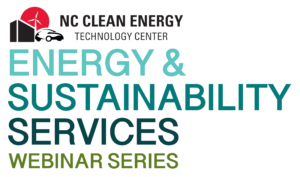 Last year, NCCETC introduced its Energy and Sustainability Services (ESS) – a suite of services from the Center aimed at optimizing sustainability and energy-related objectives for business, industry, government and utilities – before hosting the first installation of the ESS Webinar Series in December 2020. For 2021, NCCETC hosted four additional ESS webinars, starting in January with “Bus Electrification: New Advances in Electric Transit & School Buses”. Another webinar in March, “Clean Energy Training: Navigating Renewable Energy Project Planning, Deployment, and Operation in 2021” discussed how solar training programs, focused on workforce education and professional development, can support recovery and growth within the clean energy industry.
Last year, NCCETC introduced its Energy and Sustainability Services (ESS) – a suite of services from the Center aimed at optimizing sustainability and energy-related objectives for business, industry, government and utilities – before hosting the first installation of the ESS Webinar Series in December 2020. For 2021, NCCETC hosted four additional ESS webinars, starting in January with “Bus Electrification: New Advances in Electric Transit & School Buses”. Another webinar in March, “Clean Energy Training: Navigating Renewable Energy Project Planning, Deployment, and Operation in 2021” discussed how solar training programs, focused on workforce education and professional development, can support recovery and growth within the clean energy industry.
 Solar isn’t the only clean energy sector in need of expertise from a highly-skilled workforce, however; a report published by BVG Associates in early March found that the offshore wind industry offers the potential for new jobs and billions of dollars of investment in North Carolina. The BVG Associates lead team included experts from Lloyds Register Energy Americas, Timmons Group, and NCCETC. The North Carolina Office of Science, Technology, & Innovation, an operating unit of the Commerce Department, led the study project for the state and commissioned the report as part of Governor Cooper’s far-reaching commitment to build a clean energy economy to fight climate change and grow clean-energy jobs in North Carolina.
Solar isn’t the only clean energy sector in need of expertise from a highly-skilled workforce, however; a report published by BVG Associates in early March found that the offshore wind industry offers the potential for new jobs and billions of dollars of investment in North Carolina. The BVG Associates lead team included experts from Lloyds Register Energy Americas, Timmons Group, and NCCETC. The North Carolina Office of Science, Technology, & Innovation, an operating unit of the Commerce Department, led the study project for the state and commissioned the report as part of Governor Cooper’s far-reaching commitment to build a clean energy economy to fight climate change and grow clean-energy jobs in North Carolina.
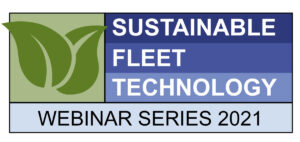 In February, NCCETC partnered with The 100 Best Fleets and NAFA Fleet Management Association for the 2021 Sustainable Fleet Technology Webinar Series to share best practices and real-world deployment examples of sustainable fleet technologies from industry leaders and top performing fleet managers. The series continued through the rest of the year, with a total of 15 free sessions aimed at leveraging the knowledge of top-performing fleets to help make fleets run more efficiently.
In February, NCCETC partnered with The 100 Best Fleets and NAFA Fleet Management Association for the 2021 Sustainable Fleet Technology Webinar Series to share best practices and real-world deployment examples of sustainable fleet technologies from industry leaders and top performing fleet managers. The series continued through the rest of the year, with a total of 15 free sessions aimed at leveraging the knowledge of top-performing fleets to help make fleets run more efficiently.
 NCCETC held the virtual State Energy Conference in April 2021 with both live and on-demand sessions. Attendees came from a variety of backgrounds, including state and local government, non-profits, startups, academia and corporate organizations – under the SEC’s theme: “Connecting North Carolina’s Diverse Energy Economy.” Governor Cooper kicked off the conference by urging conference attendees to add their voice to the discussion of North Carolina’s clean energy future. Conference sessions focused on best practices and case studies about current, emerging and innovative technologies, energy policy, commercial, industrial and institutional buildings, grid modernization, residential homes, renewable energy and utilities and infrastructure.
NCCETC held the virtual State Energy Conference in April 2021 with both live and on-demand sessions. Attendees came from a variety of backgrounds, including state and local government, non-profits, startups, academia and corporate organizations – under the SEC’s theme: “Connecting North Carolina’s Diverse Energy Economy.” Governor Cooper kicked off the conference by urging conference attendees to add their voice to the discussion of North Carolina’s clean energy future. Conference sessions focused on best practices and case studies about current, emerging and innovative technologies, energy policy, commercial, industrial and institutional buildings, grid modernization, residential homes, renewable energy and utilities and infrastructure.
In May, NCCETC added two new courses to its existing 12 online training courses which are on-demand, ongoing and offered indefinitely in our training program. These courses cover a wide variety of topics including wind energy, HVAC/R, home inspections, indoor air quality, indoor environmentalist prep, LEED, welding and an HVAC course offered in Spanish.
With support from NCCETC, local North Carolina seafood distributor Atlantic Seafood Company was awarded a $106,100 grant from the U.S. Department of Agriculture’s 2021 Rural Energy for America Program (REAP), which provides grants and/or loan guarantees to rural small businesses and agricultural producers for renewable energy systems and energy efficiency improvements. Atlantic Seafood Company is constructing a new office and distribution center in Holly Ridge, Onslow County, North Carolina, and grant funds will support the replacement of aging refrigeration equipment with new, energy efficient equipment.
Creating Solar & Solar-Plus-Storage Solutions for Local Co-Ops & Customers
Last year, the NCCETC partnered with Cliburn and Associates, LLC on the Solar-Plus for Electric Co-ops project, to help optimize the planning, procurement and operations of battery storage and solar-plus-storage for electric cooperatives. SPECs, which concluded in June 2021, and other applied research and development projects like it are working to reduce policy barriers to solar-plus storage projects at cooperatives. The resources produced by NCCETC staff and the SPECs project team will guide rural electric cooperatives on how they may best purchase and jointly deploy solar and energy storage.
In July, the NCCETC announced it would be working on behalf of the North Carolina Department of Environmental Quality to distribute funds from the federal CARES Act in order to provide community solar subscriptions to lower-income utility customers at four North Carolina municipal and cooperative utilities. This program, called Community Solar Access for Low and Moderate-Income Utility Customers, will provide a total of $166,400 to pre-pay for community solar subscriptions, which will be supplied by the participating utilities free of charge, and will save participating customers at least $15 a month on their electric bills for a period of 10 years.
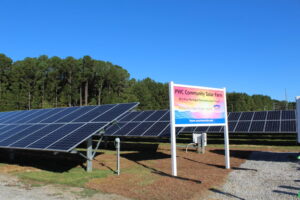 As part of the CARES Act funds, 234 reserved solar panels were issued to 26 eligible customers of the Fayetteville Public Works Commission (PWC) Community Solar Farm, making the program fully subscribed. First opened in 2019, the Fayetteville PWC Community Solar Farm was the first municipal community solar farm in North Carolina and is a large-scale, ground-mounted solar array consisting of 3,348 solar panels and includes a 560 kilowatt battery.
As part of the CARES Act funds, 234 reserved solar panels were issued to 26 eligible customers of the Fayetteville Public Works Commission (PWC) Community Solar Farm, making the program fully subscribed. First opened in 2019, the Fayetteville PWC Community Solar Farm was the first municipal community solar farm in North Carolina and is a large-scale, ground-mounted solar array consisting of 3,348 solar panels and includes a 560 kilowatt battery.
Electrification Education: Paving the Way for Emission-Free Transportation
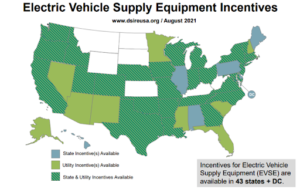 With the rapid growth in the electric vehicle (EV) market and increased attention from federal and state governments to accelerate deployment of EV infrastructure and vehicles, the Database of State Incentives for Renewables & Efficiency (DSIRE) announced the addition of incentive programs for electric vehicles and charging infrastructure to the database in August. Over 250 incentive programs for the purchase of EVs and associated charging infrastructure are currently available on DSIRE, with incentives for electric vehicle supply equipment available in 43 states and D.C. DSIRE has documented 86 bills related to EVs that were enacted in just this year.
With the rapid growth in the electric vehicle (EV) market and increased attention from federal and state governments to accelerate deployment of EV infrastructure and vehicles, the Database of State Incentives for Renewables & Efficiency (DSIRE) announced the addition of incentive programs for electric vehicles and charging infrastructure to the database in August. Over 250 incentive programs for the purchase of EVs and associated charging infrastructure are currently available on DSIRE, with incentives for electric vehicle supply equipment available in 43 states and D.C. DSIRE has documented 86 bills related to EVs that were enacted in just this year.
Electric vehicles are still in the early stages of adoption and policy making, and many states have enacted incentives to mitigate the comparatively higher up-front costs of EVs and lack of charging infrastructure to support them. Currently, public and private fleets across the country are preparing for the electric vehicle revolution and, while significant consumer adoption is forecasted, transitioning entire fleets away from conventional fuel vehicles is a much more complex process than individuals going electric.
To help guide this transition, NCCETC’s Clean Transportation Program Director Richard Sapienza surveys fleet managers year-round to find relevant session topics suited for their needs to discuss at the Sustainable Fleet Technology Conference. The fifth annual Sustainable Fleet Technology (SFT 2021) Conference returned virtually in September and consisted of 11 total webinars on the latest and greatest in sustainable fleet technology, operations and implementation. Electrification was the focus of several SFT 2021 sessions, and the conference kicked off with “Electric Vehicle Infrastructure Planning Best Practices and Considerations for Today and the Future”, showcasing effective planning and modeling along with real-world use cases to support an electrified future for different use cases. Those interested in learning more about charging solutions can benefit from the in-depth “Innovative Charging Solutions” webinar which covered power requirements, associated costs and time hurdles involved in meeting the charging needs of diverse use cases. The last session of SFT 2021, “Future Proofing Electric Charging Infrastructure”, discussed steps to fleet electrification and considerations for fleets to be ready for the future, as infrastructure deployment continues to be a moving target with needs and technology rapidly changing.
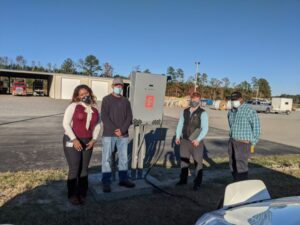 EVs have the potential to be more than just a means of transportation, too, with more automakers selling vehicles compatible with vehicle-to-grid technology. At the end of 2020, NCCETC joined the Roanoke Electric Cooperative to pilot cutting edge vehicle-to-grid technology. The Cooperative is working with Fermata Energy to pilot the first electric vehicle charging system equipment to meet the North American standard for two-way current as verified by Underwriters Laboratories. Preliminary findings from this demonstration show the economic potential of using bidirectional charging technologies to feed energy stored in electric vehicle batteries back to charging sites, especially when the grid is experiencing high demand.
EVs have the potential to be more than just a means of transportation, too, with more automakers selling vehicles compatible with vehicle-to-grid technology. At the end of 2020, NCCETC joined the Roanoke Electric Cooperative to pilot cutting edge vehicle-to-grid technology. The Cooperative is working with Fermata Energy to pilot the first electric vehicle charging system equipment to meet the North American standard for two-way current as verified by Underwriters Laboratories. Preliminary findings from this demonstration show the economic potential of using bidirectional charging technologies to feed energy stored in electric vehicle batteries back to charging sites, especially when the grid is experiencing high demand.
 NCCETC kicked off the tenth annual National Drive Electric Week in the last week of September with a tailgate and plug-in electric vehicle (EV) car show. “After participating in National Drive Electric Week for several years now, I’ve seen the impact of giving people the opportunity to ask questions and get their hands on an electric vehicle,” said Richard Sapienza, Director of NCCETC’s Clean Transportation program, “When they leave, they’re confident in making the switch to going electric and several have purchased an electric vehicle following one of these events.”
NCCETC kicked off the tenth annual National Drive Electric Week in the last week of September with a tailgate and plug-in electric vehicle (EV) car show. “After participating in National Drive Electric Week for several years now, I’ve seen the impact of giving people the opportunity to ask questions and get their hands on an electric vehicle,” said Richard Sapienza, Director of NCCETC’s Clean Transportation program, “When they leave, they’re confident in making the switch to going electric and several have purchased an electric vehicle following one of these events.”
With the focus on electrification and green mobility, including electric and alternative fuel vehicles, growing nationwide, it is expected that green mobility opportunities will also increase in the US Southeast. However, the outlook for these opportunities varies significantly by state and technology depending on adoption rate, state policies and utility efforts, and existing manufacturing facilities and infrastructure. To gain an understanding of the current state of the industry for electric vehicles and charging infrastructure and their related supply chain, as well as biofuels and hydrogen, the Embassy of the Netherlands recently commissioned NCCETC to complete a market study of the green mobility landscape in the Southeast to be a resource for Dutch companies interested in exploring these market opportunities. The report, titled The State of the Green Mobility Industry in the Southeastern United States, also provides an overview of recent developments in federal and state policy, utility programs, and brief descriptions of stakeholders in each state, including private businesses, convening non-profits and industry groups, and relevant research centers.
Thank you for a great year!
The 50 States of Solar, Grid Modernization and Electric Vehicles reports were all released quarterly in 2021. These products are all included in DSIRE Insight and are available for purchase. An Executive Summary is available for free.
For a look at our most recent fiscal year accomplishments, review our 2020-2021 Annual Report, which covers NCCETC’s major projects from the last fiscal year along with operating budget statistics and highlights.
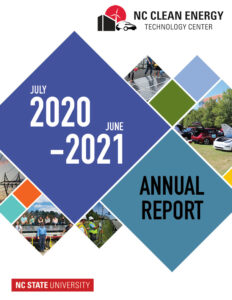
These are a few of the project and program highlights that made 2021 a successful year at NCCETC! The Center staff is looking forward to more exciting partnerships in 2022.